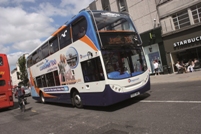
Loss making rail division dampens figures, but operator says incoming subsidies will solve this in the second half of the year
On Thursday (December 8) Stagecoach released its interim results for the six months ending October 31, 2011.
The results, excluding intangible asset expenses and exceptional items, were:
- Revenue up, at £1,293.7m (£1,133.6m 2010)
- Total operating profit down, at £106.2m (£124.7m 2010)
- Net finance charges up, at £17.5m (£16.0m 2010)
- Profit before tax down, at £88.7m (£108.7m 2010)
- Earnings per share down, at 10.1p (12.2p 2010)
- Interim dividend per share up 9.1%, at 2.4p (2.2p 2010)
The 18% slip in pre-tax profits was attributed largely to Stagecoach Group’s UK rail division, which saw a £6.9m operating loss. However, Stagecoach expects this to be stabilised by government subsidies in the East Midlands, which the operator expects to swing the rail franchise back to a small profit in the second half of the financial year.
Outside of rail, the group’s operating margins in the UK provincial bus industry are industry leading, at 18%, and there has been a £44m investment in 100 new vehicles for megabus.com in the USA – see separate story.
Commenting on the results, chief executive Sir Brian Souter said: “These are good results and we have achieved further revenue growth across our bus and train businesses in the UK and North America. Against a background of pressure on household incomes and rising fuel costs, we believe providing value for money travel is increasingly important. We are seeing continuing indications of modal shift from the car to bus and rail.
“The expected period loss at East Midlands Trains resulted in a reduction in adjusted earnings per share in the first half of the year. However, the Group is well placed to deliver stronger earnings in the second half with East Midlands Trains entitled to revenue support payments and therefore expected to return to profitability.
“In our sector-leading UK bus operations, we have invested extensively in new product innovation. This strategy has meant our business has been able to manage effectively the impact of reduced Government and local authority spending on public transport. Our turnaround plan for our London bus business remains on track.
“Excellent operational performance and high levels of customer satisfaction have underpinned continuing strong revenue growth in our commuter and long-distance UK rail businesses. We are pleased Virgin Rail Group has secured an extension to the current West Coast franchise and we will consider further franchise opportunities which we believe will deliver value to our shareholders.
“We have pushed forward with the expansion of our budget inter-city coach brand, megabus. com, which is driving high levels of growth in our North American business. We have also started to deliver on a range of business models for the roll-out of the megabus.com brand, using contractors for services outside our existing geographic footprint, and we are considering opportunities for franchising to maximise the significant potential of the brand.”
Sir Brian Souter added: “We recently completed a c.£340m return of cash to shareholders and remain in a strong financial position. We have made a good start to the second half of the financial year and current trading remains in line with management expectations. We believe the outlook for the Group is positive and our bus and rail services are well placed to benefit from the continuing consumer focus on service and value.”
A potential future investment from Stagecoach could be the “Granny Bus,” a service which would run in certain areas dedicated for pensioners. The service would be in response to government demands for operators to find £100m of cost savings from the concessionary fares scheme, and employ buses which travel less frequently and more slowly so passengers are not thrown around.
Worthing is an example of where such a service would be employed, with 70% of passengers on the concessionary scheme.
£225m of Stagecoach’s revenues come from the concessionary fares scheme, and with a cut to concessions, one possible solution is lower frequency services. Sir Brian said: “You can’t justify running a high-frequency small bus if the revenue falls to silly numbers. You would have to look at running lower frequency with bigger buses.”
Last week a Stagecoach venture was scuppered when recent attempts to get planning permission for a cross-Forth hovercraft service between Fife and Edinburgh was refused by Edinburgh Council, after the proposal was submitted in December 2009. As reported in CBW at the time, Stagecoach ran a trial of the service in 2007, which carried over 32,000 passengers in two weeks. The operator estimated it would have carried 870,000 passengers a year.
The planning permission was refused with officials citing the visual impact of the proposed ramp, noise and transport concerns as reasons for their decision, after they visited the site in the last week.
A Stagecoach spokesman said: “Stagecoach and many of the supporters of the cross-Forth hovercraft have invested a huge amount of time and money in developing plans for a service. Securing planning permission was central to the future of the hovercraft. After taking two years to vote on the facilities needed to make the service a reality, the council has killed off the hovercraft with this short-sighted decision.”
Sir Brian Souter added: “This has been a long and painful process. We are completely scunnered and have no intention of appealing against the planning decision.”
Stagecoach is continuing its support of a proposed passenger ferry between Burntisland and Granton.
The interim statement can be seen online here


